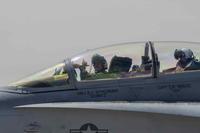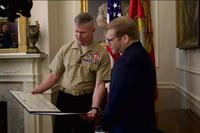This weekend marked two years since the creation of the Air Force's Global Strike Command, the service's modern-day attempt to rekindle what it had -- organizationally and culturally -- in the old Strategic Air Command. Its commander, Lt. Gen. Jim Kowalski, wrote Monday that the airmen of Global Strike have a lot to be proud of after their first two years, but things haven't reached the point that Jimmy Stewart will come back from the dead and make a movie about them.
Wrote Kowalski:
When we set out on this path two years ago we understood the need to organize our force to drive discipline and professionalism consistent with the highest standards required of us as stewards of nuclear weapons. We were confident that, over time, we would have a force that not only understood the demands of this mission, but embraced the special trust and responsibility the nation has given us. At this point we cannot declare victory. Developing an enduring culture requires a long-term commitment by all in this command, and by Air Force and Department of Defense senior leaders.
His message did not mention what could be the biggest national splash Global Strike has made since its founding -- the acknowledgement last week that Air Force missileers were getting religious-based ethics training on the use of nuclear weapons, which they nicknamed "Jesus loves nukes." Since you read about it here, the story went wild, appearing in wire service reports and on TV newscasts. From Kowalski's perspective, however, it probably wasn't that big a deal: Although longtime Air Force watchers winced when they saw yet another nuclear-related embarrassment, few Americans will probably connect "Jesus loves nukes" and "Global Strike Command."
Could Global Strike become the new Strategic Air Command -- and capture all the national prestige it once held? Probably not, given the changed realities of the world today. Americans, if they think about the military, probably do not think about nuclear weapons as they did back in the bad old days, when SAC was synonymous with ... dare we say zealotry? ... or, at very least, doomsday. Most of Global Strike Command's arsenal used to belong to SAC; its newest bomber was delivered in 1997, during the interregnum between the commands. But unlike SAC, which in its glory days was guaranteed endless new bombers and ICBMs, Global Strike will likely oversee a dwindling fleet of aging aircraft and missiles. Its ace in the hole will be the Air Force's new next-generation bomber, although as we've observed before, that airplane might lose in a budget-driven Sophie's Choice with the new KC-46A tankers.
But still, even if tomorrow's strategic airmen are watching over the same missiles and flying the same aircraft their fathers -- or grandfathers -- once did, Kowalski wrote that he wants them to do so with elan, and be ready for non-nuclear missions, too:
As we have improved our nuclear processes, we have not forgotten our significant conventional responsibilities. The command's conventional global strike and command and control capabilities were used to powerful effect during the beginning days of Operation Odyssey Dawn over Libya. We must continue to have both the discipline and flexibility to balance nuclear and conventional requirements.








